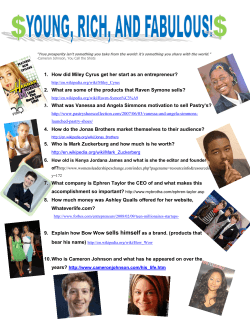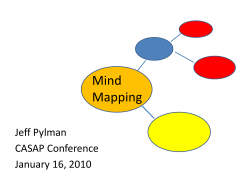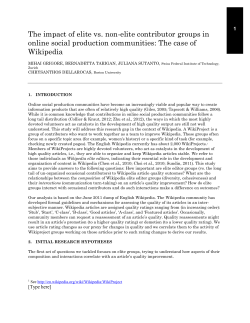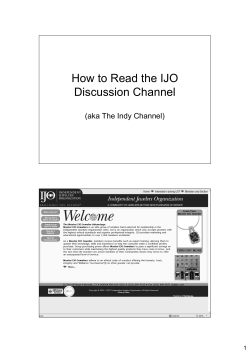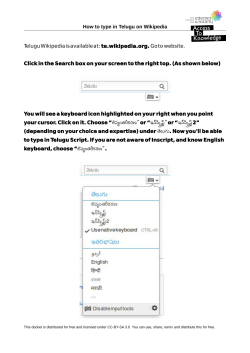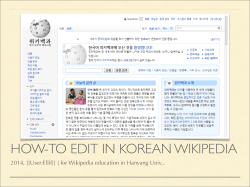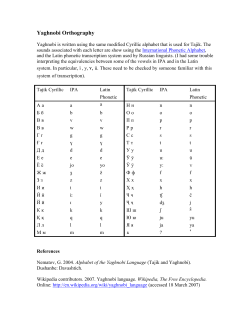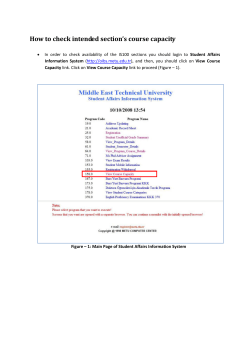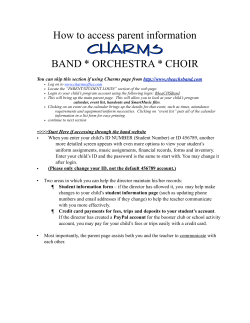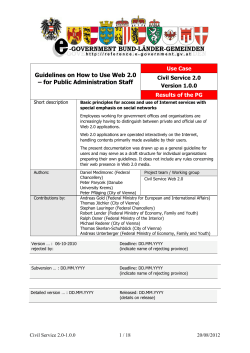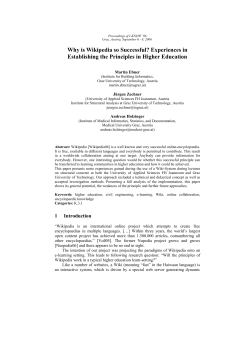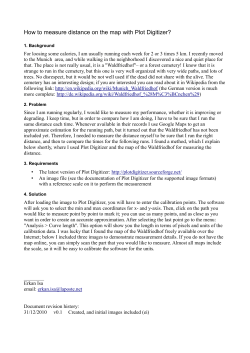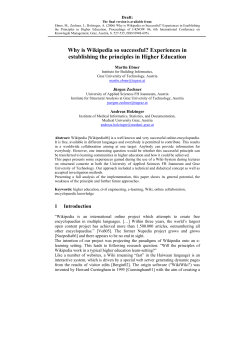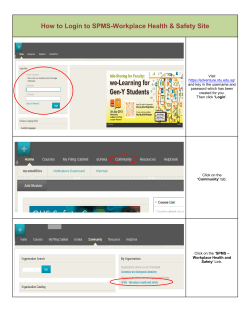
Teaching Students How to Evaluate Sources in Online Research
Willison and Joseph Sat, Nov 3, 8:30 - 8:55, Ellwood 2 Teaching Students How to Evaluate Sources in Online Research Christie D. Willison cdw9272@sru.edu Patricia A. Joseph patricia.joseph@sru.edu Computer Science Department, Slippery Rock University Slippery Rock, PA 16057 USA Abstract Technology is constantly changing and there are new problems that result from these changes. The problems of most common concern are hacking, pirating, and exploitation, just to name a few. However, aside from the criminal problems, other problems are beginning to gain more attention. One such problem is that of online research. Most professional researchers are well aware of the risks and the precautions that should be taken to avoid using invalid, unreliable sources or plagiarizing another’s work, especially when using the Internet for research. However, every year thousands of students across the United States are completing research papers in high school and college without giving any thought to the idea of plagiarism or the use of invalid sources. These students search the Internet for convenient sources and never realize that the very sources that are helping them could have been created by someone who does not have any credibility on the subject of their research. Students need to be taught how to conduct online research properly and to evaluate sources for credibility due to the growing overall number of Internet sources being used for research, both credible and otherwise. This paper addresses this pedagogical problem in detail and offers suggestions for information systems educators who must teach research methods to their students at the secondary and tertiary levels. Keywords: pedagogy, internet, online research, ethics, information systems education 1. INTRODUCTION Technology is constantly advancing and there is a whole new series of problems brought along with it. The ones that are most commonly heard of are hacking, pirating, and exploitation, just to name a few. However, aside from the criminal problems, other problems are beginning to gain more attention. One such problem is that of online research. Most professional researchers are well aware of the risks and the precautions that should be taken to avoid using invalid, unreliable sources or plagiarizing another’s work, especially when using the Internet for research. However, every year thousands of students across the United States are completing research papers in high school and college without giving any thought to the idea of plagiarism or the use of invalid sources. These students search the Internet for convenient sources and never realize that the very sources that are helping them could have been created by someone who does not have any credibility on the subject of their research. Students need to be taught how to conduct online research properly and to evaluate sources for credibility due to the growing overall number of Internet sources being used for research, both credible and otherwise. This paper addresses this pedagogical problem in detail and offers suggestions for information systems educators who must teach research methods to their students at the secondary and tertiary levels. Proc ISECON 2007, v24 (Pittsburgh): §3123 (refereed) c 2007 EDSIG, page 1 Willison and Joseph 2. THE PROBLEM There is a dilemma facing students who conduct online research. The main problem is just the sheer number of Internet sources that are available to students online. Not only is there an overabundance of information that students could not even hope to sort through but there are new problems arising. The web is no longer a completely honest place nor a place designed for scholarly professionals and academic information. There are phony web pages arising with every click of the mouse. These pages are tempting to a student as they are generally created just for that purpose with flashing lights and brilliant colors. People wonder why these web pages are not shut down so that web users are not receiving false information. The problem is freedom of speech. Yes, the same right that people usually love is making their research harder. Website makers are free to post whatever information they want online. As long as the individual is not plagiarizing someone else’s work or posting false information about an individual person that is synonymous with slander, there is little that can be done with these false pages. Phony websites are not the only problem. There are far more subtle pages out there that are hard to determine credibility of than, for example, a teenager creating a neon pink page on rocket science entitled “Ashley’s Totally Cool Facts on Rocket Science.” Obviously, even the most naive of Internet browsers could see that this sort of website would not be reliable. However, the problem is that some websites are not so obvious. Some of these sites even allow interaction of the user with the site in order to update information. These updateable sites are called wikis or sometimes blogs (Tapscott, 2007). Wikis are causing problems for teachers who are diligently working to educate students about online research. Some wikis are so professional looking that even a seasoned teacher could be fooled into thinking that they are actual credible sources. 3. WIKIPEDIAS Wikis are usually websites that allow the user to post his or her own opinion or Sat, Nov 3, 8:30 - 8:55, Ellwood 2 information on the page no matter what the user’s credibility. This allows for the average individual to post whatever information he or she wants whether it has any factual basis or not. Makers of these wikis or blogs often argue that the wikis they have are monitored by technicians or other employees to make sure that all information being posted is correct. However, even though most wikis are monitored by the webpage creators, there are often hours or even days that can go by after a fictional change to information has been made before it is fixed or deleted (Tapscott, 2007). This leaves a very large window of time in which an unsuspecting student conducting research could already have retrieved information from the website and cited it for a paper as a credible source. There has never been a more controversial or well known wiki than Wikipedia. Wikipedia is a website that can best be described as an online encyclopedia for just about any subject in existence. Sounds great and convenient, right? There is one huge problem. Despite being referred to as an encyclopedia, Wikipedia is still a wiki and is therefore subject to a manifold of errors and false postings. Students conducting online research often fall prey to its fictional information posted. That is not to say that everything on Wikipedia is fictional but merely to express the fact that Wikipedia is open to editing from any individual with an Internet connection so there are often errors mixed in with its facts (“Wikipedia’s Sticky Wicket,” 2007). Therefore, it is almost impossible to determine who the author is for each article on Wikipedia’s website so it is hardly a credible source. One would think that students who know even minimal information about conducting online research would be able to determine that Wikipedia is not a credible source. However, it is often a matter of convenience that sends students to the handy but inaccurate website. Also, Wikipedia is made even more alluring since it is a part of Google which is the most used search engine on the web. The majority of students conducting research online begin by typing in their subject into the Google search box. If it is a popular enough subject, the first link that comes up the majority of the time following the search is a link for Wikipedia. The typical student will almost always click Proc ISECON 2007, v24 (Pittsburgh): §3123 (refereed) c 2007 EDSIG, page 2 Willison and Joseph on the first link available. This makes Wikipedia a very commonly used source for papers due to its convenience and accessibility to students (“Wikipedia’s Sticky Wicket,” 2007). The articles on Wikipedia are often written at about a middle school level making it more accessible than a more credible scholarly journal article. Thus, it makes it understandable that students cannot help but be tempted by this easy source despite the fact that it is hardly credible. Not everything about Wikipedia is necessarily negative. It can be a useful asset when used for appropriate or nonacademic reasons. It is an exceptionally good tool to use for background on a research topic before researching. Teachers and professors across the country generally recognize it as a useful tool but not a credible source for citing. This lead to a policy at Middlebury College in Vermont on the use of Wikipedia. Students at the college are allowed to use the site for background information but are banned from using it as an actual source. Professors at the college praise the website for its wonderful accessibility but are wary of its open-editing system which allows much room for error (“Wikipedia’s Sticky Wicket,” 2007). Students at other colleges are still attempting to use the website without realizing the danger for error. It is this ignorance of online research that makes teaching frustrating for many English teachers across the country. Students need to be taught the consequences of using sources that are not credible. It is not merely for the teacher’s sanity or for a desired grade on a paper that credibility is stressed. It also undermines the idea of expertise in academic fields because people with no professional background are being given credibility by other people using the information they post. It devalues academics and the very idea of being an expert in a certain field. For a generation that is increasingly technology dependant and trusting of technology, it is a distinct possibility for the future that expertise in many fields will be seriously devalued and diminished (“Wikipedia’s Sticky Wicket,” 2007). It only holds a value if people are still using it. Students in this country for the moment do not value expertise the way professional researchers Sat, Nov 3, 8:30 - 8:55, Ellwood 2 do. Students care about getting the grade they want and getting the paper done. Wikipedia discourages people from conducting proper research. For instance, if a student uses Wikipedia as his or her main source for a research paper and receives an A and another student takes the time to find credible resources and gets an A, this creates a problem. The second student will not be motivated next time to take the extra time to check for credibility in resources since a student using Wikipedia got the same grade. Wikis create a domino effect as more and more of them are created every day (“Wikipedia’s Sticky Wicket,” 2007). They make it too easy for students to access them and avoid the extra time it would take to properly conduct online research. Teachers across the country in high schools and universities alike are beginning to get increasingly frustrated by this overuse of a website that they deem unreliable. If other blogs are not even considered to be sources, why would Wikipedia be allowed even if it does call itself an encyclopedia? The problem is in the word encyclopedia. This automatically seems to give Wikipedia some standing that it would otherwise not have because it downplays the fact that it is a wiki and therefore subject to a large number of possible errors. Teachers are beginning to push for Wikipeda’s banning at high schools and colleges. This is due to an eerie number of mistakes in student papers and citations that is growing by the day because of this website that students love so much. This growing number of errors recently prompted a reaction from Wikipedia’s cofounder, Jimmy Wales. Mr. Wales proposed a voluntary system on Wikipedia in which individuals could fax copies of their diplomas to Wikipedia’s office in order to establish credibility. The problem with this is it is too late. Wikipedia is already known by its motto: “the encyclopedia anyone can edit.” (Cohen, 2007) Thus, individuals who enjoy it for this reason are outraged that the website would suddenly change everything it represents. However, if the website stays the way it is then professors and teachers will continue to attempt to ban it because of its unreliability. It is likely that Wikipedia cofounder’s system will not be implemented due to the outrage it is receiving from users Proc ISECON 2007, v24 (Pittsburgh): §3123 (refereed) c 2007 EDSIG, page 3 Willison and Joseph and also the lack of support among other Wikipedia employees. For instance, the head of the Wikipedia foundation board, Florence Devouard does not support Mr. Wales’ decision (Cohen, 2007). Perhaps Mr. Wales is the only one who realizes that people are no longer giving Wikipedia the credit it previously had because it is so unreliable as a research source. Recent controversies also give new hope to teachers that Wikipedia will soon be either dismantled or changed drastically. The biggest of these controversies was the Essjay controversy. “Essjay” was the online name of a man named Ryan Jordan who faked a college degree and a different identity in order to be given free reign on Wikipedia without the editors editing what he posted. At first, Mr. Wales defended the man because Wikipedia is all about editing by individual users. However, he quickly changed his mind when he realizedthat the issue was changing the outlook on his website of other people (Cohen, 2007). The biggest problem still remaining is with the students. Most adults and professionals, even those who work for Wikipedia, are well aware of the errors that can be found on Wikipedia’s website. However, in order for students to progress as researchers and produce competent papers, they need to also be aware of the unreliability of the website. 4. SOLUTIONS TO THE PROBLEM What can be done to help students learn how to conduct online research? Students need to be educated on how to evaluate Internet sources for credibility. This education should start in middle school when students are just learning how to research. Entire class sessions need to be devoted to learning about proper research methods. For instance, students should be walked through a step-by-step process of finding Internet sources. After they are shown how to find sources, it is important that they then move onto evaluation of sources. Delilah Heil conducted a study on middle school students to see how much they know about evaluating Internet sources. The students are quizzed on what they know and then quizzed again following a lesson on evaluating Internet sources. It was found that the students knew next to nothing about researching online prior to the lesson. However, once Sat, Nov 3, 8:30 - 8:55, Ellwood 2 the students were given the proper information, they were able to conduct research online and evaluate the sources that were found (Heil, 2005). While it is being proven that middle school students are unaware of the steps to be taken when researching online, this can be seen as understandable since they are still young. However, it is certainly expected of college students to be able to evaluate Internet sources for credibility prior to including them in a research paper to be grade. In a research study on over six thousand college students’ abilities to find credible sources using search engines and databases, a test was given to evaluate their skills and knowledge. After being given a number of websites to evaluate, only 49% of the students could pick out the one credible website that met all the criteria including objectivity, authority, and timeliness. Further problems were found along with the inability to evaluate sources when only 35% of the students were able to narrow “an overly broad search.” (Janes, 2007) Thus, the problem of researching stretches even further than the inability to evaluate credible sources online when students cannot even search properly for their designated topic. To teach students how to evaluate Internet sources, it is advisable to first understand what the issues are that students have even once they have learned about evaluating Internet sources. For instance, in an interview with Rachela Permenter, an English professor at Slippery RockUniversity, she stated that one of the main problems that leads to students not checking for credibility during research is that they are “no longer convinced that quality research is worth the time and effort.” (Permenter, 2007) Students, in other words, often face more than the issue of ignorance of website evaluation; they are just too lazy to check for credibility. Also, students tend to plagiarize from these websites whether credible or not due to “ignorance and timepressure.” (Permenter, 2007) Plagiarism is often a result of lazy research which runs hand in hand most times with using invalid Internet sources. Teachers who not only check for plagiarism but tell their students that they will be checking for it generally receive better results from their Proc ISECON 2007, v24 (Pittsburgh): §3123 (refereed) c 2007 EDSIG, page 4 Willison and Joseph students (Permenter, 2007). The issue of plagiarism is often more of a problem with high school students than college students because teachers tend to be more lenient (Francis, 2005). However, this is often a result of laziness on the part of the teacher. It is very time-consuming for teachers to check whether students’ Internet sources are valid or not. It is even more time-consuming to find out if they plagiarized from those websites. However, with the rising number of websites to pick from for research comes a number of websites that aid the teacher as well. One of these websites, Turnitin.com, actually allows teachers submit student papers electronically to evaluate them for plagiarism. Students can be lazy, ignorant, and just plain overworked when they are conducting research online which can lead to all kinds of mistakes. However, it is not only the responsibility of the student to check for credibility when researching but also the teacher’s responsibility to avoid giving assignments that will most likely lead to plagiarism or the use of invalid sources. Teachers should assign research topics that invite analysis rather than just reports. Assigning reports leads to students merely using the first Internet source they find and pasting it into a document (Clothier, 2005). Students who are given assignments that require analysis rather than reporting will generally choose more academic Internet sources rather than ones that are just listings of facts. Essentially, the more academia and analysis required of the research paper, the more academic and analytic the students will be when researching. For students to become more analytic in their research, they must become more flexible in using different kinds of sources. As most professional researchers know, it is not wise to use sources all from one place. In other words, students need to be careful to focus their research on appropriate sources for their subject. While there are some research topics that may require the majority of sources to be from the Internet, most topics are best researched through a variety of sources. Thus, it is important that students first learning to write research papers be given requirements on the type of sources they may use. For instance, Sat, Nov 3, 8:30 - 8:55, Ellwood 2 students should only be allowed a certain amount of online sources for a paper with the rest coming from other places (Petroski, 2005). However, it is still important that even if the students are only allowed minimal number of Internet sources that they be credible or affiliated with a credible organization. Many methods can be incorporated into the assignment of research papers in order to keep students from plagiarizing and using unreliable sources. One method often accompanies the idea of assigning papers that require analysis. This method can usually only be used if the information systems instructor is teaching a writingintensive course. However, any information systems professor can assign students papers that require analysis of two differing points of view (Permenter, 2007). If students are forced to compare and contrast viewpoints, they must read both assignments because of the very small possibility of finding help on the Internet that combines those two specific texts. The students then use their own analytical and communication skills to research and form opinions to write about. This process not only prevents plagiarism but it also allows for a better evaluation of the students’ skills (Waldsmith, 2005). The teacher can better assess what the students are capable of individually and whether more work needs to be done on how to analyze and evaluate the relationship between articles. The actual process of teaching students how to appraise Internet sources and conduct online research can be more difficult than a teacher may realize at first. The ultimate goal of this process is for students to acquire a certain set of mind for online research that helps them to automatically evaluate Internet sources (Street, 2005). This habit of mind helps the students to determine the motivations of the organizations posting research on the web and whether it discredits them as a valid source. In helping the students to develop a certain state of mind for online research, teachers are helping to change the generations of students to come (Street, 2005). For a world that is becoming increasingly dependant upon technology, it is important that people know how to best utilize that technology. Thus, students in this Proc ISECON 2007, v24 (Pittsburgh): §3123 (refereed) c 2007 EDSIG, page 5 Willison and Joseph generation should be molded early on to conduct proper online research in order to set the precedent for generations of students to come. 5. CONCLUSION Students need to be taught how to conduct online research and find credible sources due to the massive number of websites available for research. It is no surprise that the majority of student research is being done on the Internet. This makes it the responsibility of teachers to educate the students about the positive and negative aspects of online research. Teachers also need to advise students on how to detect phony or wiki websites that are not credible sources. The experts of today are slowly watching the value of their expertise be diminished by uneducated individuals who post phony websites. This practice can be curbed through educating students. Students must be educated about online research so that society does not diminish the value of intelligence and real research. 6. REFERENCES Clothier, Jane. “A few thoughts about the theory of information literacy and the way it sometimes unfolds in the school library.” (Jul 2005) http://navigatorsru.passhe.edu/login?url=http://search.e bscohost.com/login.aspx?direct=true&db =ehh&AN=20001428&site=ehost-live Cohen, Noam. “After False Claim, Wikipedia to Check Degrees.” The New York Times. 12 Mar 2007. http://www.nytimes.com/2007/02/21/ed ucation/21wikipedia.html?ex=132971400 0&en=156f770bd93c4fa0&ei=5088&part ner=rssnyt&emc=rss Francis, Barbara. Other people’s words: what plagiarism is and how to avoid it. Berkeley Heights: Enslow Publishers, 2005. Heil, Delilah. “The Internet and student research: teaching critical evaluation skills.” Teacher Librarian 33:2 (Dec 2005): 26-29. http://web.ebscohost.com/ehost/detail?v id=5&hid=109&sid=7d0122cb-97e8- Sat, Nov 3, 8:30 - 8:55, Ellwood 2 45a8-b298aa02cea3d155%40sessionmgr107 Janes, Joseph. “Why Johnny Can’t Search.” American Libraries 38:1 (Jan 2007): 38. http://navigatorsru.passhe.edu/login?url=http://search.e bscohost.com/login.aspx?direct=true&db =aph&AN=23590115&site=ehost-live Permenter, Rachela, Ph.D. English Department. Slippery Rock University. Slippery Rock, PA. Interview. March 26, 2007. Petroski, Henry. “Discarding the Library.” ASEE Prism 15:1 (Sept 2005): 26. http://navigatorsru.passhe.edu/login?url=http://search.e bscohost.com/login.aspx?direct true&db=qeh&AN=BEDI05123062&site= ehost-live Street, Chris. “Tech Talk for Social Studies Teachers.” Social Studies 96:6 (Nov/Dec 2005) 271-273. http://navigatorsru.passhe.edu/login?url=http:// search.ebscohost.com/login.aspx?direct= true&db=aph&AN=19402868&site=ehost -live Tapscott, Don and Anthony D. Williams. “The Wiki Workplace.” Business Week Online (March 2007): 15. http://navigatorru.passhe.edu/login?url=http://search.eb scohost.com/login.aspx?direct=true&db= aph&AN=24497974&site=ehost-live Waldsmith, Lynn. “Keeping it Real.” Teacher Magazine 16:6 (May/June 2005): 11-12. http://navigatorsru.passhe.edu/login?url=http://search.e bscohost.com/login.aspx?direct=true&db =ehh&AN=1685476&site=ehost-live “Wikipedia’s Sticky Wicket.” Christian Science Monitor 99:71 (March 2007): 8. http://navigatorsru.passhe.edu/login?url=http://search.e bscohost.com/login.aspx?direct=true&db =aph&AN=24308&site=ehost-live Proc ISECON 2007, v24 (Pittsburgh): §3123 (refereed) c 2007 EDSIG, page 6
© Copyright 2025
